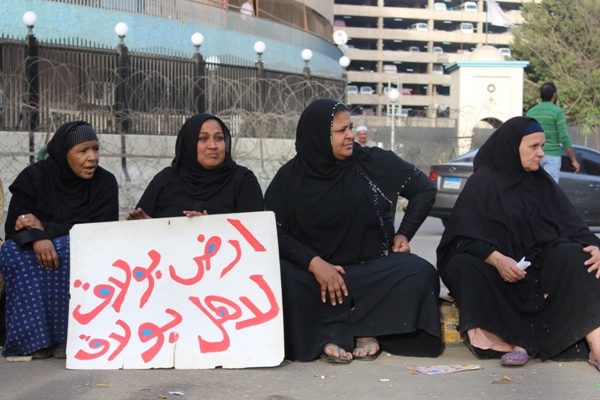 Against the backdrop of Cairo's lavish Nile City Towers along the banks of the Nile, dozens of residents of the low-income Ramlet Boulaq stood amid their makeshift homes to give a press conference about the injustices that they say they continue to face.
Against the backdrop of Cairo's lavish Nile City Towers along the banks of the Nile, dozens of residents of the low-income Ramlet Boulaq stood amid their makeshift homes to give a press conference about the injustices that they say they continue to face.
Sunday's conference – organised by the Popular Committee of Ramlet Boulaq Shack Families, the 'Neighbourhoods without Names' campaign, the Egyptian Initiative for Personal Rights (EIPR) and the Egyptian Centre for Economic and Social Rights – followed up on a number of legal disputes pertaining to the area.
A first conference was held in September of last year, exactly one month after the killing of area resident Ahmed Fathi – locally known as 'El-Bonni' – by Nile Tower security guards. His death focused considerable media attention on the area and its inhabitants.
According to Ahmed Kamel, a 35-year-old carpenter and Ramlet Boulaq resident, El-Bonni died following a dispute that arose when the Nile Tower's security office refused to pay him for temporary work he had done.
Prompted by anger and a desire for revenge, several residents converged on the towers following El-Bonni's death, torching a parking lot and attempting to storm the building. The following morning saw what residents describe as an "unprecedented" clampdown by Egyptian security forces.
Notably, the incident transpired only hours after a visit by newly appointed interior minister Ahmed Gamal Eddin to the Nile Towers.
And only days before the incident, on 27 June of last year, local residents had attacked the towers after building staff had allegedly refused to provide water to put out a fire that had engulfed one of the area's makeshift residences. The limited blaze reportedly led to the death of a five-year old boy.
Prominent Egyptian developers and investors – especially the Sawiris-owned Orascom Construction Industries (OCI) – have a longstanding dispute with area residents. According to local resident Zeinab Mohamed, 50, these powerful forces hope to evict all inhabitants and eventually assume ownership of the valuable Nile-front property.
In fact, in June of last year, the Cairo governorate issued a directive authorising police to evict area residents.
Following the death of El-Bonni, counter-terrorism police launched a security clampdown in which they arrested dozens of locals, mostly young men.
"As we were sleeping, counter-terrorism police broke down our doors and randomly arrested any young men they could find," 30-year-old resident Magdy Hassan recounted to Ahram Online last September.
Fourteen-year-old Karim Gamal Hussein recalled how he had endured teargas used during the raid. "Many of us ended up jumping from the roofs of our homes, as our mothers wailed for their sons and husbands who were being dragged away," Hussein said.
Following the raid, dozens were arrested. According to EIPR lawyer Mohamed Khedr, 51 still remain in custody, while no police officer ever provided arrest warrants.
What's more, Khedr explained that examination of footage recorded by security cameras showed that El-Bonni was not carrying any weapons at the time of his killing, contradicting police officer Yasser Ali's claims of 'self defence.' The case, however, was indefinitely suspended after having been referred to a different judge.
Another case was that of the attempted murder and excessive use of force that resulted in the injury of a local child, Anwar Ibrahim, by police officer Hisham Othman. This incident was also recorded on video and examined, but has not been followed up with any legal rulings.
The case has brought to light a number of pressing social issues, including Egypt's informal housing crisis, the privatisation of land and the resettlement of informal neighbourhoods (ashwiyaat). This is coupled with notions of state responsibility and police brutality, the latter of which had represented a main driver of Egypt's January 25 Revolution.
Ramlet Boulaq has also been affected by the 'Cairo 2050' master plan, drawn up by the housing ministry under former president Hosni Mubarak. According to this plan, all informal neighbourhoods – which make up approximately 75 per cent of Egypt's capital – will be cleared out to make room for more lucrative property projects.
According to Khedr, the Cairo governorate is continuing its efforts to evict residents based on the claim that they have no official claim to the land – despite an appeal lodged by residents against the governorate's June verdict authorising Cairo police to evict them.
Speaking to Ahram Online, Ramlet Boulaq resident Sayeda Ibrahim, 63, explained that she had lived in the area all of her life. Her son is one of the 51 arrested last August and still remains in police custody.
Pulling out her national identification card, Ibrahim pointed to the words 'Ramlet Boulaq' as her official place of residence, stressing that she would never leave the area, even if offered resettlement. "I was born here," she said. "And I will die here."



